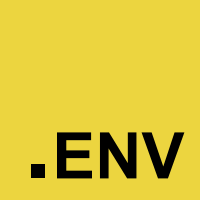dotenv

Dotenv is a zero-dependency module that loads environment variables from a .env file into process.env. Storing configuration in the environment separate from code is based on The Twelve-Factor App methodology.




Install
npm install dotenv --save
Usage
As early as possible in your application, require and configure dotenv.
require('dotenv').config()
Create a .env file in the root directory of your project. Add
environment-specific variables on new lines in the form of NAME=VALUE.
For example:
DB_HOST=localhost
DB_USER=root
DB_PASS=s1mpl3
That's it.
process.env now has the keys and values you defined in your .env file.
var db = require('db')
db.connect({
host: process.env.DB_HOST,
username: process.env.DB_USER,
password: process.env.DB_PASS
})
Preload
If you are using iojs-v1.6.0 or later, you can use the --require (-r) command line option to preload dotenv. By doing this, you do not need to require and load dotenv in your application code.
$ node -r dotenv/config your_script.js
The configuration options below are supported as command line arguments in the format dotenv_config_<option>=value
$ node -r dotenv/config your_script.js dotenv_config_path=/custom/path/to/your/env/vars
Config
Alias: load
config will read your .env file, parse the contents, assign it to
process.env,
and return an Object with a parsed key containing the loaded content or an error key if it failed.
You can additionally, pass options to config.
Options
Path
Default: .env
You can specify a custom path if your file containing environment variables is
named or located differently.
require('dotenv').config({path: '/custom/path/to/your/env/vars'})
Encoding
Default: utf8
You may specify the encoding of your file containing environment variables
using this option.
require('dotenv').config({encoding: 'base64'})
Parse
The engine which parses the contents of your file containing environment
variables is available to use. It accepts a String or Buffer and will return
an Object with the parsed keys and values.
var dotenv = require('dotenv')
var buf = new Buffer('BASIC=basic')
var config = dotenv.parse(buf)
console.log(typeof config, config)
Rules
The parsing engine currently supports the following rules:
BASIC=basic becomes {BASIC: 'basic'}- empty lines are skipped
- lines beginning with
# are treated as comments - empty values become empty strings (
EMPTY= becomes {EMPTY: ''}) - single and double quoted values are escaped (
SINGLE_QUOTE='quoted' becomes {SINGLE_QUOTE: "quoted"}) - new lines are expanded if in double quotes (
MULTILINE="new\nline" becomes
{MULTILINE: 'new
line'}
- inner quotes are maintained (think JSON) (
JSON={"foo": "bar"} becomes {JSON:"{\"foo\": \"bar\"}")
FAQ
Should I commit my .env file?
No. We strongly recommend against committing your .env file to version
control. It should only include environment-specific values such as database
passwords or API keys. Your production database should have a different
password than your development database.
Should I have multiple .env files?
No. We strongly recommend against having a "main" .env file and an "environment" .env file like .env.test. Your config should vary between deploys, and you should not be sharing values between environments.
In a twelve-factor app, env vars are granular controls, each fully orthogonal to other env vars. They are never grouped together as “environments”, but instead are independently managed for each deploy. This is a model that scales up smoothly as the app naturally expands into more deploys over its lifetime.
– The Twelve-Factor App
What happens to environment variables that were already set?
We will never modify any environment variables that have already been set. In particular, if there is a variable in your .env file which collides with one that already exists in your environment, then that variable will be skipped. This behavior allows you to override all .env configurations with a machine-specific environment, although it is not recommended.
If you want to override process.env you can do something like this:
const fs = require('fs')
const dotenv = require('dotenv')
const envConfig = dotenv.parse(fs.readFileSync('.env.override'))
for (var k in envConfig) {
process.env[k] = envConfig[k]
}
Can I customize/write plugins for dotenv?
For dotenv@2.x.x: Yes. dotenv.config() now returns an object representing
the parsed .env file. This gives you everything you need to continue
setting values on process.env. For example:
var dotenv = require('dotenv')
var variableExpansion = require('dotenv-expand')
const myEnv = dotenv.config()
variableExpansion(myEnv)
What about variable expansion?
For dotenv@2.x.x: Use dotenv-expand.
For dotenv@1.x.x: We haven't been presented with a compelling use case for expanding variables and believe it leads to env vars that are not "fully orthogonal" as The Twelve-Factor App outlines.[1][2] Please open an issue if you have a compelling use case.
Contributing Guide
See CONTRIBUTING.md
Change Log
See CHANGELOG.md
License
See LICENSE
Who's using dotenv
Here's just a few of many repositories using dotenv:
Go well with dotenv
Here's some projects that expand on dotenv. Check them out.









